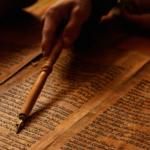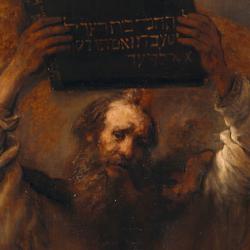The Bible hints in various ways that property is proper to human persons. The deepest hint between person and property becomes evident when we think of Yahweh’s property.
God created everything, and so is Lord of everything. We don’t own anything outright. We talk about property “rights,” but that’s the wrong term. What we have are gifts from God. They are ours, but they are ours the way a gift is ours, the way something given into our safe-keeping is ours.
That’s why the right to property and its use isn’t absolute in Scripture. Land has to be redistributed to the original owners every 50 years at the Jubilee. Farmers in ancient Israel weren’t allowed to maximize prophet from their fields; they had to leave the corner of their fields unharvested, so that they landless poor could have something to harvest. They weren’t allowed to go back to pick up sheaves the got dropped; they were left for gleaners. Vintners couldn’t go back and shake out the last few grapes from the vine; they were reserved for the poor. Our property belongs to God, and we must use it for His pleasure and not merely our own.
Our property is like the gifts we receive from the Spirit. They are ours, but they come from God. And they are to be used to bless. We don’t give away everything we have. But we do seek ways to use it to bless others. The model is a shared meal. That is the primary economic model in the Bible: Those who have sharing their goods, and their time and persons, with those who have not.
God owns everything, but He claims certain things as uniquely His own. He claims the land of promise, His house, the priests, the altar and other furnishings of the house, the meat of the sacrifices. These are “holy things” or “most holy things” because they belong to God. They are holy things because God Himself is holy, and He claims these things as His. They participate in His holiness. God’s things are charged with His personal holiness.
As His images, we too own things that become extensions of our persons. Tools and machines extend our ability to accomplish work, beyond our own muscle power. Art expresses our loves and sense of beauty and harmony. Our homes express a vision of harmony, an ideal of “home.”
A person becomes unclean because of various bodily functions, or because of contact with an animal carcass or a dead body. But a person’s clothing also becomes unclean; when he cleanses himself, he has to wash his clothes as well as his body. His clothing is an extension of his body. And houses can also become unclean, because of various forms of mold or “leprosy.” You can have skin disease, a kind of skin disease in the second skin of your clothing, and another kind of skin disease in the outer skin of your home. Your clothing and your living space are extensions of you, and share in your state of purity or impurity.
From this angle, we can see that the entire story of the fall and redemption of humanity is implied in the eighth commandment. God created Adam to have dominion, to take ownership of the creation. But God prohibited Adam from eating the fruit of the tree. It was the one thing in the original creation that belonged exclusively to God. But Adam stole it, and since then all of the children of Adam are thieves, stealing God’s holy things, assaulting God’s image by stealing from one another.
Most of all, we steal ourselves from God: We are not our own, we were bought at a price; yet we want to be our own God. Every time we disobey, we commit theft, we commit sacrilege, taking God’s holy things.
God didn’t leave us in that state. He didn’t leave us to be Adamic thieves. He sent the Son who existed in the form of God, but did not think equality with God a thing to be grasped, seized, stolen. Instead, He humbled Himself, gave Himself, emptied Himself. Though rich, He became poor that we might share in God’s riches.
And the Spirit of this last Adam, this non-thieving Adam, makes us into a new-Adamic people, who do not steal but rather imitate Jesus by laboring and giving.










